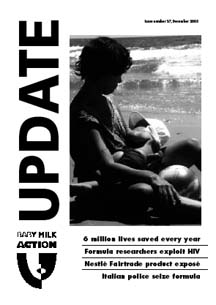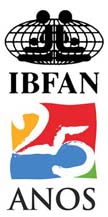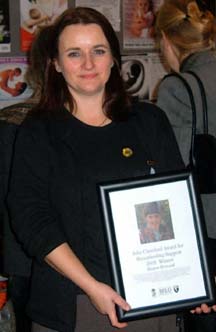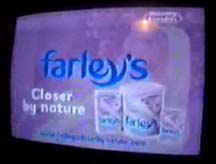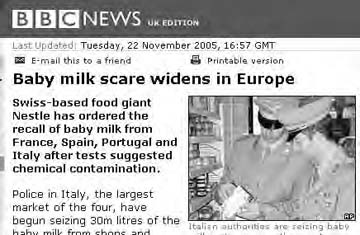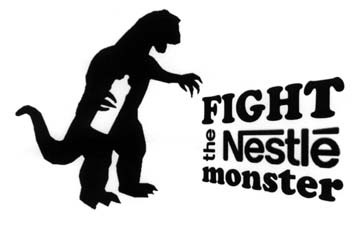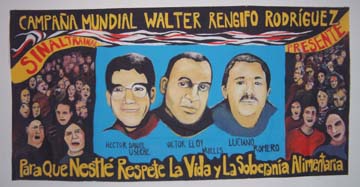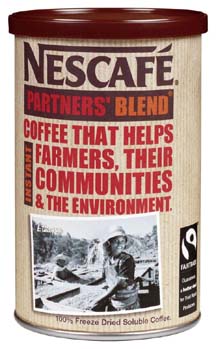 |
|
Issue
37: December 2005
Table of ContentsIBFAN 2006 Breastfeeding
calendar now available in the on-line Virtual
Shop.
|
| The 2005 third Julie Crawford Award for Breastfeeding Support, organised by the Baby Feeding Law Group was announced at the Health Visitors’ Conference in Bournemouth in November. Sharon Breward (pictured), a Health Visitor from Bethesda, North Wales won the award not only for her contribution to breastfeeding support in the UK, but also for her committment to the protection of parents from commercial influence. Five other health visitors were nominated by parents for their excellent support for breastfeeding: Lisa Arber, Jill Barnes, Gina Graham, Elspeth MacFarlane and Concy Okwe. |
Paying tribute to the mothers in her care, Sharon is outspoken about commercial promotion:
“I believe that our profession is long overdue a hard look at itself. Are we merely paying lip service to our public health role while as health visitors (and indeed our professional conference and journal) acting as a conduit for the marketing activities of milk companies? There has been much wringing of hands in the health visiting profession regarding the ‘culture’ of artificial feeding. The impression is that there isn't much that we can do about it, but health professionals are a main pillar supporting the cultural acceptance of artificial feeding as normal in our society.”
Ten years ago the local NHS trust moved the sale and provision of baby milk out of health clinics and fully endorsed a strong ethical basis to its breastfeeding policy. The breastfeeding initiation rate in Sharon's caseload is now 76% (up 25% over 5 years) 85% of whom are still breastfeeding at 8 weeks. Nationally about 50% have stopped by that time.
Breastfeeding bills
On Nov 8th, David Kidney MP proposed a new parliamentary bill to make it illegal to prevent or harass women breastfeeding in public. This would give mothers in England and Wales the same protection as mothers in Scotland, where a similar law was passed a year ago.
Welsh campaigners have a petition for a Breastfeeding Bill in Wales (sign the petition at http://www.petitionthem.com/default.asp?sect=detail&pet=1251).
-
Police asked Margaret Boyle-White to stop breastfeeding her child on a bench in Watton, Norfolk, after a complaint from a member of the public. Margaret said she was ‘shocked’ and ‘intimidated’ (BBC website).
Breastfeeding is saving six million lives annually, but 2 million die needlessly
Six million lives a year are being saved by exclusive breastfeeding and global breastfeeding rates have risen by at least 15% since 1990, says a new report released on the 15th anniversary of the Innocenti Declaration.
“Exclusive breastfeeding is one of the most powerful tools we have to combat child hunger and death” said UNICEF’s Executive Director Ann Veneman at the report’s launch at an anniversary meeting in Florence in November. She praised the vast international community of breastfeeding advocates, including IBFAN, who have worked to turn the Innocenti promises into action, bringing us closer to the Millennium Development Goals.
The Innocenti Declaration on the Protection, Promotion and Support of Breastfeeding led to the Baby Friendly Hospital Initiative and has encouraged governments to take action to support breastfeeding and implement the International Code. Today nearly 20,000 hospitals in 150 countries have become ‘baby friendly’ and more than 60 countries have implemented the International Code of Marketing of Breastmilk Substitutes and subsequent, relevant Resolutions of the World Health Assembly in legislation. But there is still a long way to go. If the Innocenti goals are met one-fifth of all child deaths could be prevented - saving over 2 million children per year.
Participants at the meeting which was hosted by the Regional Authority of Tuscany, ceremoniously signed a new Declaration which will be available before 2006. See http://www.innocenti15.net/index.htm
The lack of marketing controls in the USA is reflected (as it is in the UK) in high rates of artificial feeding. During emergencies such as Katrina, this greatly increases the risks to infants. UN guidelines for emergencies stress the critical importance of breastfeeding and relactation. |
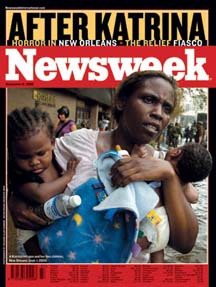 |
Guidelines on infant feeding in emergencies:
http://www.who.int/child-adolescent-health/Emergencies/IYCF_emergencies.htm http://www.ennonline.net/ife/ifeops.html
Breastfeeding improves wage earning
An important new study from Brazil by Cesar Victora confirms the impact of breastfeeding on intellectual development. After adjustment for confounding variables, there was a highly significant trend in school achievement with increased breastfeeding, suggesting a 10–15% difference in wage-earning performance and income.
Victora et al, Breastfeeding and school achievement in Brazilian adolescents Acta Pædiatrica, 2005; 94:1656–1660
IBFAN responded with concern to reports that the post of UNICEF’s Legal Officer, who advises policy makers on implementing the Code and Resolutions, was to be axed. UNICEF has agreed to preserve the post for a year as capacity is built in regional offices.
Codex Chair uses ‘red card’ threat over transparency
It was disturbing to witness the lack of respect for procedures at the FAO/WHO Codex Committee meeting in Bonn in November. The meeting was once more dominated by people who represented the views of industry, over 90 as NGO fronts or as part of government delegations, including six on the Chinese delegation and six on the US delegation. To make matters worse, the Chair, Prof Grossklaus, seemed to consider that consensus was reached, not when there was a lack of sustained opposition, but when dissenting voices were consigned to the report.
For 10 years IBFAN, Consumers International and other NGO networks such as IACFO, ILCA and ENCA,* have supported developing countries in their efforts to bring the global standards on breastmilk substitutes and baby foods into line with the International Code and Resolutions. Since the formation of the World Trade Organisation these standards will be used as benchmarks in trade disputes.
In answer to our questions about why the Declarations of Interest of the Expert Working Group on the composition of infant formula had still not been made public (see Update 36) Prof. Grossklaus threatened us with a ‘red card’ (as used in soccer games) simply for raising such a potentially embarrasing issue. The excuses were that there was no evidence of conflicts of interest, that there was no time to sort out intellectual property issues and that the working group was not ‘official’ so the rules on risk assessment set out in the Codex Procedural Manual did not apply. We maintained that although the report of the Expert Group contained many strong recommendations it was weak in other areas, for example, on the safety of soya and optional ingredients. The lack of transparency brought everything into question.
The discussions on the standard for cereal-based foods for infants reached a conclusion, but only after Tanzania, India, Botswana, Kenya, Zimbabwe, South Africa and others insisted on crucial changes to the section on nutrition claims. The compromise wording now allows governments to ban nutrition claims and so protect breastfeeding and indigenous foods without facing challenges of Technical Barriers to Trade. The standard also refers to the International Code and Resolutions and states that the products should be spoonfed and labelled as not suitable for infants before six months of age.
The discussion on WHO’s Global Strategy on Diet began too late to ensure that sugar levels in baby foods were lowered.
*IACFO:
Int. Assoc. of Consumer Food Orgs,
ENCA: Eur.Network of Childbirth
Assocs,
ILCA: Int. Lactation Consultant
Association.
One third of British mothers think formula milk is “as good as” or “better than” breastmilk
Armed with two new surveys and monitoring evidence which demonstrated that company information misleads parents, the UK made a strong submission for changes to the EU Infant Formula Directive at the Expert meeting with the European Commission in September. But will the Commission listen and will the UK implement the International Code and Resolutions before it has to report back to the Committee on the Convention of the Rights of the Child in 2007?
The majority of pregnant women and new mothers in the UK believe they have seen infant formula advertising even though it's been banned for ten years, proving that companies’ ambiguous advertising of follow-on milks does serve to promote infant formula (see press release 19 September 2005). In a MORI survey of 1000 women for the National Childbirth Trust and UNICEF, 60% said they had seen formula advertised. Around a third said the advertising gave the impression that infant formula milk was "as good as" or "better than" breastmilk. 17% of those who used follow-on milk said they started before their baby was three months old - even though it's unsuitable for children of this age.
Similar findings were found by a Department of Health survey.
Internal documents shame Ofcom
The UK Government’s Office of Communications (Ofcom) is responsible for regulating the broadcast media and has refused to take action over Heinz ‘Closer by Nature’ advertisements for Farley’s formula shown on the Discovery Health Channel. (Update 36).
Ofcom has argued for over a year that the advertisements are clearly for follow-on formula and so outside the scope of the UK Law, which only prohibits the advertising of infant formula to the general public. We say the ad is deliberately ambiguous.
Internal Ofcom documents obtained by using the Freedom of Information Act include an email from Hillingdon Environmental Health (the home authority for Heinz) to Ofcom saying:
“I was unable to work out the precise product pictured in the video footage.”
Ofcom’s investigator agreed:
“I don’t know what product appears in the credits as no information is given on the pack shot. Discovery have told us that the product was follow-on formula.”
Officially Ofcom continues to insist: “...the purple background correlated with follow-on products. We do not see therefore where the connection to infant formula can be made.”
The Environmental Health and Ofcom experts were confused by the advertisement. What do you think? Click here to watch the advertisement. Let us know what your views via the contact us page. |
NUMICO sales up
NUMICO’s aggressive marketing for its Milupa and Cow & Gate brands is resulting in 12.9% growth in sales in the UK, Indonesia and Eastern Europe. (Ingredients.com)
-
Cow & Gate is promoting its branded telephone ‘Careline’ to health workers: “we’re happy to take calls direct from mums. So, when you can’t be there to listen, we can be an extra pair of ears.... We’re keen to show you that we’re a valuable source of additional impartial help for you... and you could win £250 to spend at Marks & Spencer.”Clearly NUMICO is confused as to meaning of the word 'impartial' and is prepared to break the International Code's prohibition on seeking direct and indirect contact with mothers (Article 5.5) and on offering inducements to health workers (Article 7.3).
New UK guidance on contamination
New advice from the Department of Health and the Food Standards Agency on the preparation and storage of infant formula, says that feeds should be made one at a time with boiled water at 70 degrees C. The website guidance for health workers and the Birth to Five booklet states that powdered formulas are not sterile, but the parents bottle feeding booklet does not make this clear.
See http://www.food.gov.uk/news/newsarchive/2005/nov/infantformulastatementnov05
New Welfare Food Scheme
The first phase of the new scheme, Healthy Start, started in Devon and Cornwall in October. It supports breastfeeding and healthier eating. Parents will exhange vouchers for fresh fruit and vegetables, cow’s milk or infant formula.
See http://www.healthystart.nhs.uk/
Formula researchers exploit HIV
Researchers at Bath University have seized on HIV as a means to gain funding and access to infants in developing countries to trial a new infant formula containing ‘xanthine oxidase.’ (see Update 36)
Our concerns about the ethics of using such vulnerable children and the way the project is being promoted increased with the sensational front page headline in the Bath Chronicle, “Millions given Aids hope.” (20.10.05). The article greatly exaggerated the potential benefits of the new milk and the risk of transmission of the HIV virus through breastmilk and ignored the risks of artificial feeding (See, for example, Iliff et al. Early exclusive breastfeeding reduces the risk of postnatal HIV1 transmission and increases HIV-free survival. AIDS 2005, 19:699-7082).
The project has received funding from an unnamed Dutch milk company, Rotary International and the SETsquared Partnership and has falsely implied collaboration with UNICEF and WHO (Setsquared Partnership is a joint social investment initiative between universities in Bath, Bristol, Southampton and Surrey). In fact the research is not in line with WHO guidelines and although UNICEF has not as yet examined the data sent by the researchers, it is concerned that yet another formula is being promulgated as ‘better’ prior to proper testing.
In many developing countries where HIV/AIDS rates are highest, the risk of death from not breastfeeding is far greater in the early months of life than the risk of HIV infection through breastfeeding. UN guidelines stress that artificial feeding should be used only when acceptable, feasible, affordable and sustainable.
See the Your Questions Answered section for further information on HIV and infant feeding.
Contaminated formula seized in Italy
At the end of November pictures of police seizing Nestlé’s ready-to-feed infant formulas in Italy following a court order went around the world. The milk was contaminated with ITX (isopropylthioxanthone), a component in the ink used on the Tetra Pak packaging. The matter was first reported on the European Rapid Alert System (RASFF) in September. To the media Nestlé presented the recall (two months after the alert) as its own ’precautionary measure’ and initially blamed Tetra Pak and Italian politics, describing the matter as a ‘storm in a teacup.’ (see, for example, the Hindustan Times).
Peter Brabeck, Nestlé Chief Executive, was forced to apologize for a "memory lapse" after claiming Nestlé reached an agreement with the Health Ministry in July to keep selling the contaminated milk. The Minister is threatening legal action. On 1st December EFSA wrote to Nestlé and Tetra Pak protesting that in public statements the companies had misrepresented its guarded opinion as an all clear (see our press release for analysis of Nestlé's media management strategy).
Nestlé milks have since been recalled from France, Spain, Portugal and Greece and Milupa milk has also been recalled in Italy.
The UK Food Standards Agency (FSA) says Tetra Pak has stopped using ITX for infant formula packaging but the FSA is allowing the sale of existing stocks of Milupa, Cow & Gate and SMA brands, thought to contain low levels of ITX. The FSA reflects the European Food Safety Authority (EFSA) advice which on 24th November stated:"On the basis of the very limited data available today, the presence of ITX in food could be considered undesirable but it is not likely to present a health risk at the levels reported. The European Commission has requested that EFSA carry out a risk assessment on ITX. EFSA will provide preliminary advice in the next two weeks and expects to deliver its final opinion no later than March 2006."
The Panel issued a statement on 9 December, which generated headlines such as Nestlé vindicated by EU safety finding with Dow Jones stating: "Nestle can feel vindicated by the EU finding that ink from baby milk packaging isn't harmful, says Kepler Equities, and lauds Nestle's quick action in addressing issue. "This always seemed like a storm in a teacup" for food companies like Nestle and Numico (37561.AE), says Kepler, with issue getting blown out of proportion."
This ignores the fact that Nestlé knew of the contamination for months and only began a recall when Italian police began seizing formula following a court order. Baby Milk Action wonders who spun this as the EFSA advice is once again more circumspect, particularly when considering the impact on infants (see http://www.efsa.eu.int/press_room/press_release/1258_en.html):
"The potential dietary exposure of infants and young children could therefore be higher than that of adults. Following the review of available genotoxicity studies, the Panel concluded that the findings from animal studies did not indicate a genotoxic potential for ITX. EFSA therefore advises that ITX does not give cause for health concern at the levels reported. There are no data available at present on aspects other than genotoxicity. If contamination of foods with ITX was to continue, the Panel would wish to make recommendations about further studies that may be needed."
This case highlights the lack of safety data and gaps in safeguards on chemicals, which Greenpeace says is “typical of over 90% of chemicals sold in Europe and permitted for widespread use." It also highlights the need to strengthen the EU’s chemicals policy as called for by a proposed 7directive on the registration, evaluation and authorisation of chemicals (REACH). While IBFAN has been urging that REACH protects vulnerable populations, the powerful chemicals industry is attempting to reduce its force. Artificially-fed babies are already immune compromised and could be consuming these products as a sole food for many months at a crucial age of development. The cumulative effects of multiple exposures to tiny amounts of different chemicals will only be apparent after what is effectively a mass uncontrolled trial, without informed parental consent. Surely a reason to proceed with caution?
Nestlé re-launches in China
Nestlé’s failure to speedily recall Neslac formulas with higher-than-permitted levels of iodine prompted a consumer boycott and falling sales in China (Update 36). Nestlé is confident its new tactics, re-assuring parents with medical representatives in retail outlets and adding a ‘thumbs-up’ logo to the Neslac 3 label, will recover market share.
The International Code prohibits any idealising of breastmilk substitutes and direct or indirect contact with mothers of infants and young children (China Daily 17 October 05).
- The Chinese delegation to Codex included 6 representatives from infant formula companies - but no Nestlé. Is it out of favour? (see above).
Watch out! UK trial of HA formulas
The Dutch company Numico is seeking permission in several UK hospitals to trial a hydrolysed-protein-based (HA) infant formula on British babies after allegedly being refused permission in the Netherlands. The Numico trial offers 6 months supply of free formula to parents. We have expressed our concern about “HA” formulas and the ethics of this trial.
See our briefing: The impact of commercial research on infant feeding.
Bottled water in Bulgaria
| IBFAN is urging the Bulgarian Ministry of Health to stop Devin, Bankia and Thorn Spring bottled waters from carrying idealised images and claims of endorsement from the Bulgarian Paediatric Association. Such claims conflict with the 2005 Guidelines of the International Paediatric Association (IPA) (See Latvia story Update 36) | 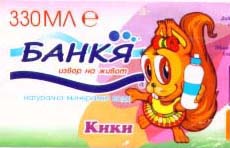 |
Under EU rules governments can permit bottled waters to carry a positive ‘suitable for infant feeding’ claim. The UK has not yet done this. We are advocating that instead of permitting waters to carry a positive claim of suitability (which will undermine breastfeeding and promote bottled waters) products which are NOT suitable for infants should be required to carry a warning to this effect.
- The UK Food Standards Agency has tested 15 brands of bottled water. Six, including Nestlé’s Buxton water, exceeded the recommended limit of uranium for infants. (FSA(TOX/2005/27) - pdf file, Mail on Sunday, 22.10.05)
Nestlé boycott news
|
Click here to download this great new logo donated to us by graphic designer, Rebecca Clark. Thanks Rebecca!
|
As Nestlé has launched a Fairtrade coffee product and is using it to try to divert criticism of its unethical business practices we are taking a special look in this issue at Nestlé suppliers and workers.
Swiss tribunal investigates assassination of Nestlé trade union leaders and other concerns about Nestlé in Colombia
Nestlé launched its Fairtrade product, Partners’ Blend coffee (see below) in the same month that witnesses presented evidence in Bern, Switzerland. The Tribunal was convened by Multiwatch, a coalition of Swiss development, church, trade union and political organisations. Nestlé refused to participate, but gave a written submission denying all wrong-doing. |
The Tribunal heard evidence from the Colombian Food Workers’ Union (Sinaltrainal) of:
-
Human rights abuses: Nestlé has denounced trade union leaders who have subsequently been threatened and sometimes killed by paramilitaries.
-
Disrespect for workers rights: Nestlé refused to recognise the legally registered Sinaltrainal trade union and has targetted those involved in it. In addition, on 17 September 2003 staff were pressured to resign so a replacement workforce could be emloyed on lower pay without benefits won by the union.
-
Re-labelling of expired milk: On six occassions Nestlé has had milk confiscated by the authorities in Colombia. The company was importing expired powdered milk from Uruguay, Argentina and New Zealand and re-packaging it.
-
Pollution of water sources: Documentary evidence of pollution of water sources and the environmental damage resulting was handed to the Tribunal.
The Tribunal panel, consisting of Anne-Catherine Menétrey-Savary (Psychologist, National Council Swiss Green Party), Carlo Sommaruga (Parliamentary Committee for Human Rights), Dom Tomas Balduino (Brazilian Catholic Bishop), Carola Meier –Seethaler (Philosopher) and Rudolf Schaller (Lawyer, National Council Swiss Green Party) said in its ruling that it:
“can only condemn Nestlé’s actions in Columbia and believes that these are unacceptable from a multinational which claims to be worthy of the good reputation and trust it receives from its clients. Nestlé has overstepped all tolerable limits whether through its failings in terms of the quality of its products or the protection of the environment, or through its policies of dismantling working conditions or its implacable hostility towards trade unions, or even through its aggressive methods in terms of economic policies.”
The panel called upon: "...all international jurist organisations, churches, trade union organisations and NGOs to denounce Nestlé’s actions and those of other multinationals that flout human rights and expose their employees to violence or dire poverty."
Click here for an audio report from the Tribunal, including interviews with key participants.
Nestlé Fairtrade a ‘big joke’
Baby Milk Action interviewed a Sinaltrainal researcher present at the Tribunal who claimed that 150,000 families in Columbia have lost their livelihoods in coffee farming and a similar number in the dairy industry due to Nestlé’s policies. Asked about Nestlé’s new Fairtrade Partners’ Blend and Nestlé’s claim that this shows its commitment to suppliers, he said: “This is a big joke. Nestlé is lying to the people.”
Click here to listen to the interview.
Trade union leader in dispute with Nestlé Philippines assassinated
Trade unionists at the Nestlé factory in Cabuyao, Laguna, the Philippines have been picketing the factory since January 2002. A strike was called as Nestlé refused to negotiate over pension benefits, despite rulings instructing it to do so from the National Labor Relations Commission, the Court of Appeals and the Supreme Court. Nestlé has employed a new workforce and security and police have been periodically accused of abusing strikers. On 22 September 2005, trade union leader Diosdado Fortuna spoke at the picket line and was shot and killed by unidentified gunmen as he was on his way home.
Solidarity campaigners at the Swiss Tribunal claimed that Fortuna had received death threats over his union work. Click here to listen to an interview recorded at the Tribunal.
The International Union of Food, Agricultural, Hotel, Restaurant, Catering, Tobacco and Allied Workers' Associations is calling for an investigation of the case. See: http://www.iuf.org/cgi-bin/campaigns/show_campaign.cgi?c=118.
Nestlé Fairtrade threatens baby milk and coffee campaigns
On 7 October 2005 Nestlé and the Fairtrade Foundation revealed they had been working together secretly for the past two years to bring Partners’ Blend Coffee to market.
Baby Milk Action and many others argued that a link with Nestlé would undermine our campaign (so damaging infant health) and bring the mark into disrepute (see our press release 6 October 2005). We called for Fairtrade’s own ‘disgrace clause’ to be used as a basis to refuse the mark, at least until Nestlé makes substantial changes to its business practices.
Nestlé has since launched a major PR campaign, including a 2-page advertorial in the Radio Times (circulation over one million - click here for full details). We have reported this to the Advertising Standards Authority as it portrays Nestlé as the saviour of coffee farmers without mentioning that just 200 farmers in El Salvador and a small number in a cooperative in Ethiopia benefit. Over 3 million coffee farmers worldwide are dependant on Nestlé. They remain outside the Fairtrade system and are paid cripplingly low wages. According to experts, the amount of coffee involved in Partners’ Blend is 3,000 bags, or just 0.02% of Nestlé’s coffee purchase of 15 million bags (0.00185% of its turnover). Click here for statements from Baby Milk Action and other organisations.
John Hilary, Campaigns and Policy Director at War on Want, said: “The fair trade movement was set up to challenge the practices of companies like Nestlé, which have traditionally amassed huge profits by paying their suppliers rock bottom prices. How can such a company deserve the fair trade mark?" Sharon Greene, UNISON Women's Officer, said "This is a cynical attempt by Nestlé to try to divert attention away from their scandalous baby-milk marketing activities in the world's poorest countries and their appalling employment practices." |
From 500 questionnaires completed on our website it is clear many people incorrectly believe the Fairtrade mark means the company treats all suppliers well and that there are no significant ethical concerns about it. However the results show that boycotters who visit our site are not taken in and many say they will now have to look more closely at other companies with Fairtrade products. But for those who do not check our website, the mark and its implicit backing from campaignsleading development organisations make it a valuable PR tool against the baby milk and coffee campaigns and one which Nestlé will use to the full.
What does the Fairtrade mark mean?According to the Fairtrade Foundation Q&A: "The Fairtrade mark is only given to individual products and not to companies. The mark indicates that Nestlé's Partners' Blend has complied with the internationally agreed standards for Fairtrade certification. It does not refer to any other product marketed by the company. This product has undergone exactly the same certification process as all other Fairtrade products whether marketed by multinationals or smaller companies. The Fairtrade mark guarantees consumers that those producers have received a fair and stable price for their product. The mark is not an endorsement of any company or its activities." |
Nestlé’s website, Grow more than coffee, blames the impoverishment of coffee farmers on oversupply and claims “NESCAFÉ Partners' Blend, our first Fairtrade certified coffee, is our latest initiative to help solve this longstanding problem.” But the issue is not oversupply, it is who holds the power in the supply chain. Coffee processors have played farmers off against each other driving prices down, while their own profits soar. According to Oxfam, Nestlé makes 26% profit on its coffee, more than any other product on the shelves.
Will Partners’ Blend be a PR coup or a PR disaster? We are keeping track. Nestlé’s attempts to counter the boycott have failed before and already the launch has generated articles around the world highlighting its appalling ethical record. New Internationalist’s full page adverts in the Guardian and Big Issue, suggested that a Fairtrade Nestlé coffee is as credible as a Fairtrade organic ‘McBurger’, a Fairtrade petrol or a Fairtrade missile called 'Fairy Dust.' ? NI highlighted the alternative IFAT mark, which is for companies rather than products.(see http://www.ifat.org/)
Another alternative is a new initiative, SEEcompanies.com, which was launched in November. This invites companies to answer questions about their social, environmental and ethical record. SEE Companies can demand access to audit a company if it is thought to have answered falsely.
Nestlé - most boycotted
A 17-country GMIPoll survey found Nestlé to be one of the four most boycotted companies on the planet and the most boycotted in the UK, by 2 to 1.
A survey of 1,000 students released by the National Union of Students Services Ethics Committee shows Nestlé is the most boycotted brand. Women and older students were more likely to boycott Nestlé, with a third or more rejecting the company. Nestlé also topped the list of companies students would not work for due to ethical concerns.
The Ethics Committee has also found that 38% of Student Unions currently have official boycotts of Nestlé in place.
A debate between Baby Milk Action and Nestlé at your college will raise awareness of the boycott and guard against new contracts being drawn up without the full facts.
How Reagan supported Nestlé
A former employee of the new US Ambassador to the UN, John Bolton, has written to the Senate recalling his role in opposing the International Code in 1981. Lynne D. Finney said Bolton asked her to persuade delegates from other countries to vote with the US to weaken the Code and that Bolton “shouted that Nestlé was an important company and that he was giving me a direct order from President Reagan.. He yelled that if I didn’t obey him he would fire me... I said I could not live with myself if even one baby died because of something I did... He screamed that I was fired.” (See Boston Globe 24 April 2005).
Methodists to profit from Nestlé malpractice?
The Methodist Church Joint Advisory Committee on Ethics of Investment (JACEI) commended Baby Milk Action’s work in monitoring the baby food industry in a report on Nestlé released on 24 November. Despite acknowledging “there are still areas of ethical concern relating to marketing and promotion of breastmilk substitutes” it “cleared the way for the Church’s investment agency, the Central Finance Board [CFB] to invest in Nestlé if it wishes to do so.”
Baby Milk Action was forced to reveal its reservations about the consultation process, such as the fact that the ‘independent expert’ was a consultant to the baby food industry. NGOs and health experts also voiced concerns.
The report will go to the Methodist Conference in June 2006. We hope that the CFB will take account of the strong support for the campaign in the wider church.
See our press release of 24 November 2005 for further information.
Please contact us if you are a member of the Methodist Church and would like support in opposing the Church profiting from Nestlé malpractice.
MPs on Nestlé jollies
Tom Levitt MP, the Parliamentary Private Secretary of the UK’s International Development Minister defended Nestlé’s record on baby food marketing in the Glossop Advertiser (23 Nov) when questioned on his acceptance of hospitality from Nestlé to attend the Wimbledon Tennis Championship. Nestlé is currently a major employer in Mr. Levitt’s constituency with its Buxton Water brand, through which it sponsors Wimbledon. Baby Milk Action has offered to provide documentary evidence of malpractice.
Shadow Minister for Foreign Affairs, Anne McIntosh, led a delegation of MPs and Members of the House of Lords to South Africa to visit Nestlé ‘school and environmental’ projects. Flights and hotels were paid for by Nestlé. Other MPs known to be on the trip are: Nick Brown, Doug Henderson, Julie Kirkbride and Frank Roy (a government whip). Nestlé is currently opposing efforts by the South African government to implement the International Code and Resolutions in legislation to stop violations.
By forging links with MPs Nestlé is also hoping to offset the impact of the proposed UK Children’s Food Bill which seeks to ban junk food marketing to children (see http://www.sustainweb.org/). 45% of Nestlé’s 8,500 products are high in sugar, salt or fat.
Ask your MPs and Trade Union to support the Nestlé boycott. A suggested letter is on the on-line version of this newsletter. For the contact details of your MP see http://www.theyworkforyou.com/ (You could select and copy the following text to paste and modify).
Suggested messageI am one of your constituents and I am writing to ask for you to give your support to the international Nestlé boycott, if you have not done so already. Boycotts have been launched against Nestlé in 20 countries because the company aggressively markets baby foods, violating international standards more than any other company, so contributing to the unnecessary death and suffering of infants around the world. While Nestlé now claims its malpractice dates from the 1960s and 1970s (though it denied it at the time) on-going independent monitoring demonstrates violations of the World Health Assembly marketing requirements remain systematic and institutionalised. Please contact Baby Milk Action for the latest information. Where national legislation has been introduced and enforced violations are stopped, demonstrating it is possible for companies to comply. Yet Nestle opposes legislation and, where it is not held to account, continues its aggressive practices, putting its own profits before health. The boycott remains essential to keep up the pressure and raise awareness. Baby Milk Action can explain how the boycott has helped to stop some cases of malpractice. I hope you will join the list of MPs who endorse the boycott and would be grateful if you could inform me of your position. To endorse, contact Baby Milk Action, 24 Trumpington Street, Cambridge, CB2 1QY. archive.babymilkaction.org or call 01223 464420. |
Nestlé sweet talks the unions
At a debate with Baby Milk Action and UNISON at the Trades Union Congress in September, Nestlé hardly mentioned marketing. It claimed to be a nutrition education company and focused almost totally on its donations for emergencies, its partnerships and HIV.
Ask your Trade Union to support the Nestlé boycott.
Tribunal call
Nestlé may be softening its opposition to our proposed Tribunal into its marketing practices. Senior Policy Advisor, Beverley Mirando, told the University of East Anglia student radio that Nestlé is now prepared to consider taking part. We shall see. In a cross-campus referendum students voted to continue their 9-year boycott by nearly 2 to 1.
Welcome Nestlé’s shift in position on the Tribunal. Write to: Peter Brabeck-Letmathé, Chief Executive, Nestlé S.A., Vevey, Switzerland. (You could select and copy the following text to paste and modify).
Suggested messageI understand that your Senior Policy Advisor has indicated Nestlé is now prepared to participate into an independent, expert Tribunal into your baby food marketing activities. I wish to welcome this change in policy and encourage you to respond positively to Baby Milk Action's recent letter to you. Baby Milk Action is clearly convinced its case against your practices stands up to scrutiny and it has been to Nestlé's shame that you have not, so far, demonstrated a willingness to put your denials forward for the same scrutiny. Please confirm that your Senior Policy Advisor's comment was genuine and that progress can now be made for the Tribunal to take place. |
Tap water awards
The reputation of the Tap Water Awards, the corporate-free alternative to Nestlé’s Perrier Comedy Award, continues to grow. This year’s winners were:
- Rob Newman (who helped launch the Perrier Award boycott),
- Theatrum Botanicum,
- Westminster School,
- Soma,
- No Fit State Circus,
- Chasing My Tale,
- Gamarjobat and
- Aurora Nova @ St. Stephens.
The award is organised by the Out of the Blue Trust and the Bongo Club at the Edinburgh Fringe Festival.
The Perrier Award audience was reminded of Nestlé malpractice as some mischevious campaign supporters projected a message through the window of the auditorium.s

